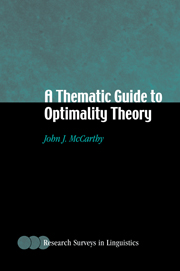Book contents
- Frontmatter
- Contents
- How to Use This Book
- Acknowledgments
- Prologue
- 1 The Core of Optimality Theory
- 2 The Context of Optimality Theory
- 3 The Results of Optimality Theory
- 4 The Connections of Optimality Theory
- Epilogue
- Appendix A Frequently Asked Questions
- Appendix B Symbols and Abbreviations
- References
- Index of Names
- Index of Constraints
- Index of Languages
- Index of Topics
Epilogue
Published online by Cambridge University Press: 08 January 2010
- Frontmatter
- Contents
- How to Use This Book
- Acknowledgments
- Prologue
- 1 The Core of Optimality Theory
- 2 The Context of Optimality Theory
- 3 The Results of Optimality Theory
- 4 The Connections of Optimality Theory
- Epilogue
- Appendix A Frequently Asked Questions
- Appendix B Symbols and Abbreviations
- References
- Index of Names
- Index of Constraints
- Index of Languages
- Index of Topics
Summary
Nothing we do is complete…
No statement says all that could be said…
We cannot do everything
and there is a sense of liberation in realizing that.
- Oscar RomeroThroughout this book, I have proceeded in a top-down fashion, starting with the basic premises of OT, deducing various consequences from them, and weighing prediction against observation. This has been possible because of the simplicity and clarity of Prince and Smolensky's basic insights.
We have seen that OT does not have all the answers, but it does have many of them. The idea of comparing output candidates using a hierarchy of ranked, violable constraints really does seem to capture some fundamental truth about human language. The results derived from OT span the traditional linguistic disciplines of phonology, morphology, and syntax. OT has also renewed connections that had been allowed to lapse. For example, in my own field of phonology, language acquisition and, to a lesser extent, language typology seemed always beyond the reach of theoreticians. But because OT is inherently typological and is easily coupled to a plausible learning theory, it has renewed interest in acquisition and typology among those who work in phonological theory.
The insights and the changes of perspective that OT has brought are quite important, but their revolutionary character should not be overestimated. In Chapter 2, I showed how the problems that OT addresses and some of the ideas that it includes have historical continuity with the study of generative grammar dating back to the late 1960s and early 1970s.
- Type
- Chapter
- Information
- A Thematic Guide to Optimality Theory , pp. 237 - 238Publisher: Cambridge University PressPrint publication year: 2001



